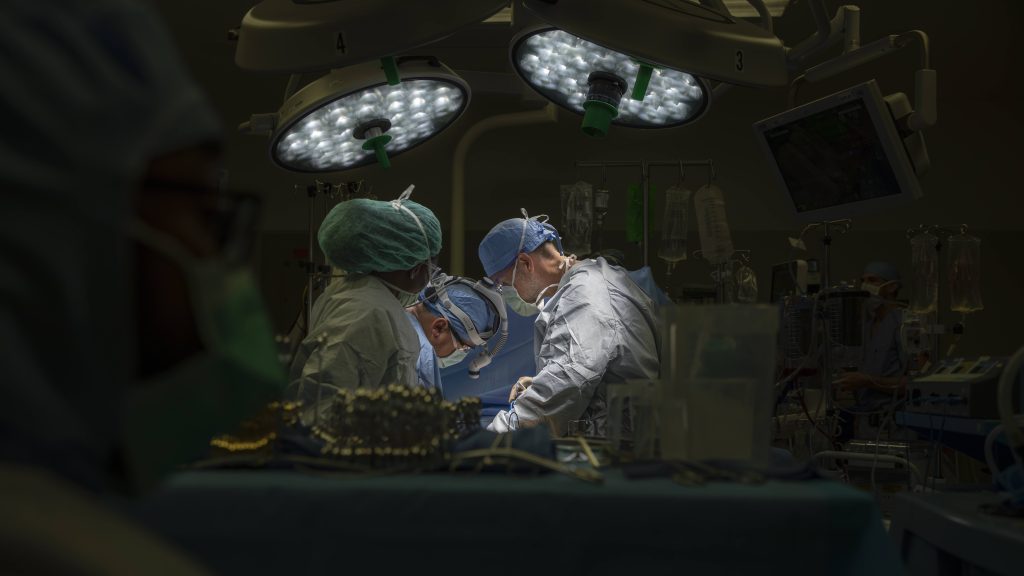-
Featured News
Transplant program at Mayo Clinic in Florida celebrates its 25th anniversary with vision for future of transplant

JACKSONVILLE, Fla. ― Twenty-five years ago, the transplant center at Mayo Clinic in Florida performed its first solid organ transplant — a liver transplant. To date, the center has performed nearly 9,000 lifesaving transplants as one of the largest combined solid organ transplant programs in the U.S. The center has provided consistently high-quality patient care before and after organ transplants since its establishment. Based on more than two decades of vast experience in organ transplant, center physicians and scientists have an eye toward the future through the program's Transforming Transplant initiative, which seeks to transform the practice through research and innovation by redefining standards of care for patients in organ failure.
"What we do is really a passion," says Burcin Taner, M.D., chair of the transplant center at Mayo Clinic in Florida. "We don't see it as a job. This is a lifestyle. It gives us tremendous happiness to see that we are able to help patients. With the Transforming Transplant initiative, our aim is that, one day, no patient will die waiting for an organ transplant."
Journalists: Sound with Dr. Taner is available in the downloads at the end of the post. Please courtesy: "Mayo Clinic News Network." Name super/CG: Burcin Taner, M.D./Transplant/Mayo Clinic.
The Florida transplant program began as a liver transplant program. Kidney transplant was added in 2000, with heart and lung transplant added in 2001. The transplant program has been reporting some of the highest volumes, lowest median wait times and highest survival rates in the country, based on data published by the Scientific Registry of Transplant Recipients.
As of February 2023, Florida's transplant program has achieved the following:
- 8,533 total solid organ transplants
- 4,050 total liver transplants
- 2,886 kidney transplants
- 789 lung transplants
- 530 heart transplants
- 212 kidney/pancreas transplants
- 55 pancreas transplants
- 11 heart/lung transplants
*as of Feb. 23, 2023
Transforming Transplant
Physicians and scientists at Mayo Clinic in Florida are leading Transforming Transplant, a Mayo Clinic enterprise strategic initiative, to provide new clinical options for patients with organ dysfunction and failure. Related research and innovation breakthroughs will address challenges and limitations that have historically existed for the practice. This initiative is a partnership between Mayo Clinic's organ transplant programs and the Center for Regenerative Biotherapeutics.
"The number of patients waiting for an organ transplant outpaces the number of organs available to transplant those patients," says Dr. Taner. "That gap has been widening every year. Each day in this country alone, 20 patients die waiting for an organ transplant. The Transforming Transplant project was initiated by Mayo Clinic in Florida. And then it became an enterprise strategic initiative. It's designed to address the unmet needs of patients waiting for organ transplants."
One of the initiative's goals is to restore and improve the quality of donated organs that were previously considered inferior quality or medically risky to be transplanted. An example of this is the ex-vivo lung perfusion (EVLP) technology located at the Discovery and Innovation Building on Mayo Clinic's campus in Jacksonville, Florida. Through a collaboration with United Therapeutics, donor lungs are flushed and ventilated while being monitored in isolation. This process allows transplant programs to reevaluate lungs that would otherwise have been discarded. The system circulates fluids through donor lungs, keeping them healthy longer than would be possible in cold storage.
The transplant team is also working with Carnegie Mellon University to advance research into the bioengineering of organs that could be used in place of human organs, eventually reducing the dependence on organ donation, decreasing the wait for donor organs, and increasing the transplant rate to help more patients in organ failure. This collaboration will transform the practice of medicine through biotherapeutic technologies that make organ transplantation more accessible, affordable and available to a broader population.
The Transforming Transplant initiative also seeks to advance research and accelerate innovation into stem cell-based therapies to prevent organ failure after transplant. Recently, a new study found that stem cells show the potential to slow organ rejection in lung transplant patients. This discovery offers hope of one day providing a cellular therapeutic to extend the lives of patients who would not qualify for a second lung transplant after organ rejection.
Another goal of the initiative is to prevent the need for transplant by diagnosing disease early and developing innovative treatment methods to reverse disease process with the ultimate goal of preventing organ failure in many patients. Artificial intelligence (AI) is an example of one innovation being used for early detection and treatment for disease, and in some cases provides information that may prevent the need for a transplant altogether. AI also is being used to predict rejection after transplant.
Mayo Clinic's Transplant Center, with locations in Arizona, Florida and Minnesota, has performed nearly 30,000 organ transplants since 1963. More than 100,000 patients nationwide are awaiting organ transplants. Mayo Clinic is the largest integrated transplant center in the country.
###
About Mayo Clinic
Mayo Clinic is a nonprofit organization committed to innovation in clinical practice, education and research, and providing compassion, expertise and answers to everyone who needs healing. Visit the Mayo Clinic News Network for additional Mayo Clinic news.
Media contact:
- Tia R. Ford, Mayo Clinic Communications, newsbureau@mayo.edu







